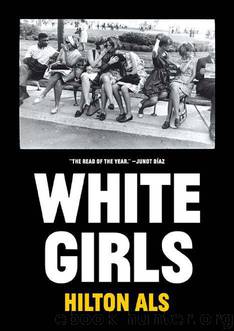White Girls by Als Hilton

Author:Als, Hilton [Als, Hilton]
Language: eng
Format: mobi, epub, azw3
ISBN: 9781940450063
Publisher: McSweeney's
Published: 2013-11-30T05:00:00+00:00
Of course, part of Mathers’s genius lies in his ability to market his story to the white counterculture. He knew he wasn’t the only wigger out there. From the beginning, he wrote for the white counterculture as much as he produced music that blacks could identify with. This bears some resemblance to Sly Stone’s marketing technique in the early nineteen seventies. Sly produced funk, but his lyrics were all about love, peace, and understanding. He made black dance music for white hippies.
Nowhere in his music does Mathers ever claim he wants to be black, like some sad, inner-city Elvis. Critics who assume he does are missing the point, along with so much else. In the superficial writing that has grown up around his white hair and white T-shirt, the pathos at the heart of his lyrics is gilded over if not missed altogether. His “rage” is that of the disillusioned romantic. Mathers can’t quite believe the world is the world. Nor can he believe there’s not enough love in it—especially for him. He writes with the hyperrealistic vividness of the romantic who can recall every slight, real or imagined. On “Kim,” a song about his estranged wife that appears on The Marshall Mathers LP, Mathers sends this letter from home:
How could you?
Just leave me and love him out of the blue
Oh, what’s the matter, Kim?
Am I too loud for you?
Too bad, bitch, you’re gonna finally hear me out this time
At first, I’m like all right
You wanna throw me out? That’s fine!
But not for him to take my place, are you out of your mind?
This couch, this TV, this whole house is mine!
How could you let him sleep in our bed?
Look at Kim
Look at your husband now!
The operative word here is “look.” Given Mathers’s background, where all eyes were turned on Mom as she made scenes, could Mathers feel he was real? That he existed? Moms and bullies sucked all the air out of the room. In order to be heard, he did what born writers do: he learned to listen—to himself, and to others, to stories. And like most born performers, he longed for his work to be seen. As a teenager in Detroit, he began rapping on the underground music scene, where he made a name for himself. He released an album, but it didn’t do much. He was given a second chance at fame when the music producer and rapper Dr. Dre got a hold of the disc, liked the lyrics, and commissioned Mathers to record something else. He was given the money and time to fine-tune his sense of difference through the hard work of making words carry meaning in a country where intellection is viewed with suspicion. Yet instead of looking at Mathers’s words—the core of his art—which would generate analysis, discourse, a complicated response, his gang looks at his public persona, which is relatively simple. He’s the rude American boy with a class chip on his shoulder. But what does that boy see, feel, think?
Download
This site does not store any files on its server. We only index and link to content provided by other sites. Please contact the content providers to delete copyright contents if any and email us, we'll remove relevant links or contents immediately.
| Books & Reading | Comparative Literature |
| Criticism & Theory | Genres & Styles |
| Movements & Periods | Reference |
| Regional & Cultural | Women Authors |
4 3 2 1: A Novel by Paul Auster(12359)
The handmaid's tale by Margaret Atwood(7739)
Giovanni's Room by James Baldwin(7309)
Asking the Right Questions: A Guide to Critical Thinking by M. Neil Browne & Stuart M. Keeley(5745)
Big Magic: Creative Living Beyond Fear by Elizabeth Gilbert(5733)
Ego Is the Enemy by Ryan Holiday(5400)
The Body: A Guide for Occupants by Bill Bryson(5067)
On Writing A Memoir of the Craft by Stephen King(4923)
Ken Follett - World without end by Ken Follett(4712)
Adulting by Kelly Williams Brown(4558)
Bluets by Maggie Nelson(4540)
Eat That Frog! by Brian Tracy(4507)
Guilty Pleasures by Laurell K Hamilton(4430)
The Poetry of Pablo Neruda by Pablo Neruda(4084)
Alive: The Story of the Andes Survivors by Piers Paul Read(4013)
White Noise - A Novel by Don DeLillo(3998)
Fingerprints of the Gods by Graham Hancock(3982)
The Book of Joy by Dalai Lama(3965)
The Bookshop by Penelope Fitzgerald(3832)
